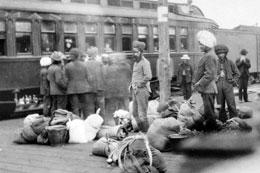Some key dates in a century of Sikhism in B.C.

1904: The arrival of the first wave of Sikh immigrants. The census listed 258 Sikhs. Siri Guru Granth Sahib Ji, the Sikh Holy book was first brought to Canada by Bhai Arjan Singh. The scriptures were located at a house in Port Moody.
1905: For the next three years, 5,000 Sikhs came to Canada.
1906: A house was rented in Vancouver to start a Gurdwara or Sikh place of worship.
1907: Foundation stone of the Gurdwara for Khalsa Diwan Society was laid at 1866 West 2nd Avenue, Vancouver.
1908: On Jan. 19, the first Sikh parade (Nagar Kirtan) took place to celebrate the opening of the Gurdwara on West 2nd Avenue in Vancouver. The first Granthi or priest was Bhai Balwant Singh.
1909: Establishment of Guru Nanak Mining and Trust company and plans to buy 440 acres of land in West Vancouver.
1911: The census for that year listed 2,342 Sikhs, less than half of that in 1908. Only three were women.
1912: Gurdwaras were built in Victoria, Fraser Mills and Abbotsford. Hardial Singh Atwal was the first Sikh born in Canada on Aug. 28. Hardial is the son of Balwant Singh Atwal, the first priest of the 2nd Avenue Gurdwara.
1914: The Komagata Maru, with 376 passengers, mostly Sikhs, under the leadership of Bhai Gurdit Singh, May 23, arrives in Vancouver. The Komagata Maru was escorted out of Vancouver under the guard of the Canadian Navy.
1918: Sikh population in British Columbia dropped to as low as 700. Mayo Lumber Company built a Sikh temple near Duncan at Paldi. This town was named after the village in India.
1919: Immigration restrictions on bringing wives and children under eighteen years old from India were lifted. Sikh women and children started arriving from India.
1925: Khalsa Diwan Society had autonomous branches at Vancouver, Abbotsford, New Westminster, Golden, Duncan, Coombs and Ocean Falls.
1929: Khalsa Diwan Society invited Charles Andrew, a friend of Mahatma Gandhi and Sir Rabindranth Tagore, Nobel laureate, to see firsthand the unfair treatment of the Sikhs.
1944: Survey of Sikhs in Canada showed that there were 1,756; 98% of them lived in British Columbia.
1947: Sikhs were granted franchise to vote and become Canadian citizens.
1950: Narajan Singh Grewal was the first Sikh elected to a city council in Mission, B.C. In 1954 he would again make history when he is elected mayor of Mission.
1951: There were 2,148 Sikhs in Canada. 1969: March 30, foundation stone for the Khalsa Diwan Society Gurdwara at 8000 Ross Street was laid.
1975: Sikh Samachar, a newspaper, was published by the B.C. Sikh societies.
1979: The 500th birthday of Guru Amar Das Ji. Since that year, an annual Khalsa Day parade (Nagar Kirtan) is held in Vancouver.
1980: Federation of Sikh Societies of Canada was the first Sikh organization registered nationally.
1986: Khalsa School, a full-time private school, was established in Vancouver. This school teaches Sikh religion and Punjabi language classes. Khalsa Credit Union was registered on Feb. 19, to provide financial service to the Sikh Community.
1990: On March 15, the solicitor general of Canada announced that the RCMP dress code would be amended to have a turbaned Sikh join the force. Const. Baltej Singh Dhillon of B.C. Had the honour of becoming the first baptized Sikh to join the RCMP.
1991: Three Sikhs were elected to the British Columbia legislature. Manmohan (Moe) Sihota and Ujjal Dosanjh went on to hold various cabinet posts. The other MLA is Harbhajan (Harry) Lalli.
1993: Harbans (Herb) Dhaliwal from Vancouver and Gurbax Singh Mahli were the first Sikhs elected to the Canadian Parliament in Ottawa. Vancouver's Punjabi Market at 49th Avenue and Main Street was officially recognized with bilingual signs in English and Punjabi.
1996: In September, British Columbia schools started to offer Punjabi language in its regular curriculum from Grades 5 to 12.
1996: There were over a hundred Gurdwaras across Canada. Fifty of them were in B.C. Opening of the Sikh Resource Centre in Vancouver to celebrate the centennial of the Sikhs in Canada on July 28.
1998: The Gurdwara Sahib Dasmesh Darbar is established. It will over the years stage the biggest Vaisakhi parades outside of India.
1999: A postage stamp was issued to commemorate the contributions that Sikh Canadians had made in the building of Canada.
2012: The first Sikh community base cadets, 3300 Royal Canadian Cadet Corp (Bhai Kanhaiya) was established by The Friends of The Sikh Cadet Society, led by Harbinder Singh Sewak.
2017: B.C. declares April as Sikh Heritage month.
2019: B.C. declares April 13 as “The Jallianwala Bagh Massacre Day” to mark the massacre of unarmed Punjabis in the city of Amritsar by British soldiers.









